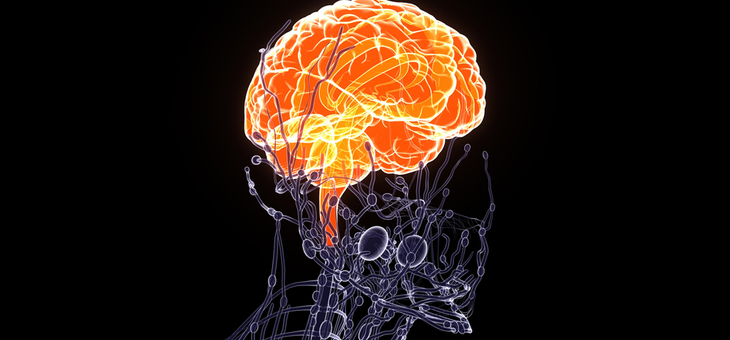New research focusing on the brain’s lymphatic system offers hope of improved treatment for Alzheimer’s disease patients.
The study, published in Nature last week, concentrated on the brain’s newly discovered drainage system, called the meningeal lymphatic system. The researchers suggested that drugs could be developed to enhance its function, which would then improve the performance of drugs that target the toxic protein beta-amyloid in the brain. Clumps of beta-amyloid are a ‘hallmark’ of Alzheimer’s disease, and researchers have been disappointed by mixed results from clinical trials of several anti-amyloid drugs.
The lymphatic system, sometimes dubbed the body’s ‘sewerage system’, transports infection-fighting white blood cells throughout the body.
The other main roles of the lymphatic system include:
- managing the fluid levels in the body
- reacting to bacteria
- dealing with cancer cells
- dealing with cell products that otherwise would result in disease or disorders
- absorbing some of the fats in our diet from the intestine.
Read more: New films portray fear and loss of dementia
Biotech company PureTech health is developing therapeutics to modulate lymphatic flow in the central nervous system to target neurodegenerative diseases such as dementia.
“The lymphatics are a sink,” Dr Jonathan Kipnis, a co-author of the study, explained in a statement. “Alzheimer’s and other neurodegenerative diseases such as Parkinson’s and frontotemporal dementia are characterised by protein aggregation in the brain. If you break up these aggregates but you have no way to get rid of the debris because your sink is clogged, you didn’t accomplish much. You have to unclog the sink to really solve the problem.”
The role of meningeal lymphatic vessels, which connect the brain and the immune system and help to keep a healthy fluid balance in the brain, was not confirmed until 2018 by researchers at Virginia Tech.
“As you age, the fluid movement in your brain slows, sometimes to a pace that’s half of what it was when you were younger,” said Jennifer Munson, a study co-author and an assistant professor at Virginia Tech’s Department of Biomedical Engineering and Mechanics.
“We discovered that the proteins responsible for Alzheimer’s actually do get drained through these lymphatic vessels in the brain along with other cellular debris, so any decrease in flow is going to affect that protein build-up.”
Dr Kipnis and fellow researchers at the Washington University School of Medicine in St. Louis then tested the hypothesis that “the disappointing performance of anti-amyloid drugs may be explained by functional differences in the lymphatic drainage system in individual patients”.
“Mice with ablated meningeal lymphatics showed significantly higher build-up of beta-amyloid plaque than did controls with intact drainage systems,” the scientists found.
The patterns of the mice with damaged lymphatics resembled those of people with Alzheimer’s.
The hope is that future studies will help identify the ‘genetic signatures’ of individual humans to help understand how their lymphatic system is operating, “so personalised combination treatments to slow the progression of Alzheimer’s can be developed”.
“These findings suggest that supporting the meningeal lymphatic system in people with Alzheimer’s ₋ and starting treatment early in the disease, when this system is more intact ₋ could lead to better outcomes,” said Dr Molly V. Wagster, from the National Institute of Ageing, a major funder of the research.
Read more: Medical focus must shift to pre-clinical dementia
What is Alzheimer’s disease?
Alzheimer’s disease is the most common form of dementia, affecting up to 70 per cent of all people suffering from the disease, says dementia.org.au. It damages the brain, impairing memory, thinking and behaviour. It can affect adults at any age, but mostly afflicts people over the age of 65.
The brain is fed and supplied with oxygen by a complex vascular network of arteries, veins and capillaries, which is segregated from the rest of the blood stream. This barrier makes it difficult to treat infections and conditions such as Alzheimer’s, because therapeutics such as antibiotics are too large to get through.
Brains with Alzheimer’s have deposits that stop signals passing between brain cells. When those cells die, the brain shrinks.
A person can live from three to 20 years with the condition, the average being seven to 10 years. Diagnosis can only be made after “careful clinical consultation”.
There is no cure. However, one group of drugs appears to be providing some temporary improvement in cognitive functioning for some people with mild to moderate forms of the condition.
Scientists are investigating why those deposits occur and now, how to deal with them safely.
For more information contact the National Dementia Helpline on 1800 100 500.
Has your family been touched by dementia? When do you think improved treatments for dementia will be available?
Read more: Loss of pleasure linked to dementia
If you enjoy our content, don’t keep it to yourself. Share our free eNews with your friends and encourage them to sign up.

